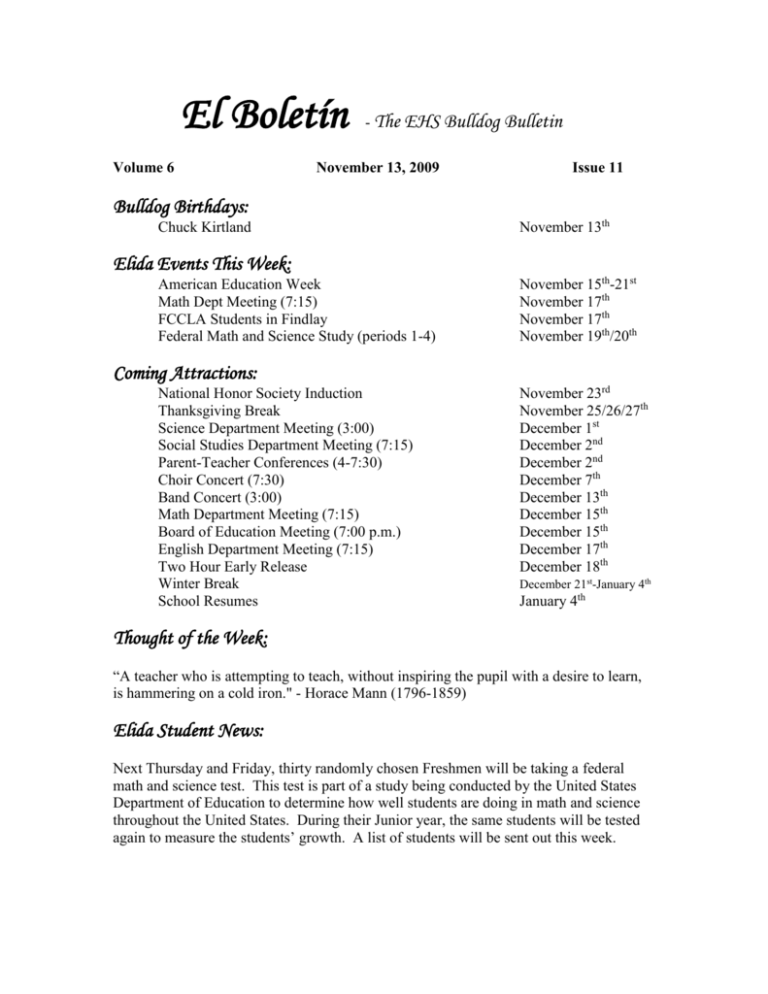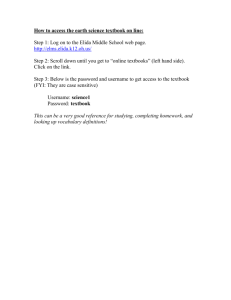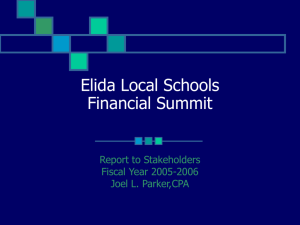Volume 6 November 13, 2009 Issue 11
advertisement

El Boletín Volume 6 - The EHS Bulldog Bulletin November 13, 2009 Issue 11 Bulldog Birthdays: Chuck Kirtland November 13th Elida Events This Week: American Education Week Math Dept Meeting (7:15) FCCLA Students in Findlay Federal Math and Science Study (periods 1-4) November 15th-21st November 17th November 17th November 19th/20th Coming Attractions: National Honor Society Induction Thanksgiving Break Science Department Meeting (3:00) Social Studies Department Meeting (7:15) Parent-Teacher Conferences (4-7:30) Choir Concert (7:30) Band Concert (3:00) Math Department Meeting (7:15) Board of Education Meeting (7:00 p.m.) English Department Meeting (7:15) Two Hour Early Release Winter Break School Resumes November 23rd November 25/26/27th December 1st December 2nd December 2nd December 7th December 13th December 15th December 15th December 17th December 18th December 21st-January 4th January 4th Thought of the Week: “A teacher who is attempting to teach, without inspiring the pupil with a desire to learn, is hammering on a cold iron." - Horace Mann (1796-1859) Elida Student News: Next Thursday and Friday, thirty randomly chosen Freshmen will be taking a federal math and science test. This test is part of a study being conducted by the United States Department of Education to determine how well students are doing in math and science throughout the United States. During their Junior year, the same students will be tested again to measure the students’ growth. A list of students will be sent out this week. From Superintendent Debra Delisle’s weekly newsletter… Shine the spotlight on: Elida Local School District and Fairborn City Schools Elida High School in Allen County hosted a tribute to local veterans last Thursday and honored them during a breakfast and panel discussions in social studies classes. See this website for more! www.learnandserveohio.org Elida Teacher News Congratulations to Denny Schwinnen for being selected for induction into the Ohio Tennis Coaches Association Hall of Fame. Mr. Schwinnen will be inducted at a banquet on Sunday, February 28 in Columbus. From Amy Amspoker – Check this out! www.Flashcardmachine.com Once you create an account (FREE) you can make sets of flashcards for vocabulary or other items in your class. You also have access to flashcards that others have made. (It is up to you if you would like others to be able to view your flashcards). After you have created the set you can add pictures, sounds, etc. depending on your content areas (music, art, etc.). I have used the cards in class as a quick review using the projector. Also, when you create your card set it gives you a website to give the kids that will allow them to use the flashcards at home or during a study hall without creating an account. It is also nice review for exams because it gives you the opportunity to combine different card sets to review. So, if you made a card set for each chapter that you have covered up until semester exams, you can review all of those vocabulary words. Along with this, students are able to upload the flashcard sets to their ipod so that way they can review them at any time. This requires the use of the iStudyToGo program and does cost $19.99. It does not work on every type of ipod so this is something that I would read through carefully before telling kids to go buy it! :) I thought it was a neat idea though... Teenage Tidbit The risk of motor vehicle crashes is higher among 16- to 19-year-olds than among any other age group. In fact, per mile driven, teen drivers ages 16 to 19 are four times more likely than older drivers to crash. Famous Educator Bio – Marva Collins Marva Collins, born August 31, 1936, to Henry and Bessie Knight, Jr. in Atmore, Alabama, is an educator who in 1975 started Westside Preparatory School in Garfield Park, an impoverished neighborhood of Chicago, Illinois. She ran the school for more than 30 years until it closed in 2008, due to lack of sufficient enrollment and funding. She is famous for applying classical education successfully with impoverished students, many of whom had been wrongly labelled as 'learning-disabled' by public schools. She once wrote, "I have discovered few learning disabled students in my three decades of teaching. I have, however, discovered many, many victims of teaching inabilities." She has written a number of manuals, books and motivational tracts describing her history and methods, and currently (2006) has a web site and public speaking service. She was most widely publicized in the 1981 biographical TV movie The Marva Collins Story starring Cicely Tyson and Morgan Freeman. She graduated from Clark College in Atlanta, Georgia known today as Clark Atlanta University, and then taught school for two years in Alabama, then moved to Chicago, where she taught in public schools for fourteen years. In 1975 she started Westside Preparatory, which became an educational and commercial success. In 1996 she began supervising three Chicago public schools that had been placed on probation. In 2004 she received a National Humanities Medal, among many awards for her teaching and efforts at school reform. Marva Collins uses the Socratic method, modified for use in primary school. The first step is to select material with abstract content to challenge students' logic, and that will therefore have different meaning to different students, in order to aid discussion. This is done specifically to teach children to reason.Next, the teacher should read the material, because unknown material cannot be taught. New words, the words to watch, should be listed, and taught, for pronunciation, use and spelling before the material is read. Without this step, the reading is meaningless. Next, one begins a series of pertinent questions as the reading progresses, starting with a reference to the title, and a question about what the material is about. Predictions should use logic, reasoning and evidence without fallacy. The reading must be out loud, so the teacher can ask questions at pertinent points. Students are taught to test their reasoning. Afterward, they write daily letters to the author or characters, and write a critical review. Why is the work important to them? The child must be taught to refer to what was previously learned to support their opinions. In the Socratic method, the rate of information is controlled by the teacher. Properly paced, this encourages participation, reducing discipline issues and encouraging self-discipline. The program specifically avoids work-sheets and inane busy work. It establishes an intellectual atmosphere, a general attitude suspending judgement, and examining reasoning. Classroom Blogs Help Develop Learning Skills Using classroom blogs can be a great way for teachers to promote student learning. Here are four different kinds of classroom blogs: Class News Blog. What went on in sixth period today? When is the next group project due? Questions like that can be easily answered by a classroom blog. Students can write up the news reports and see their writing in “print.” A daily blog can also be a great way to post homework assignments useful for parents as well as absent students. Mirror Blog. Blogs allow students to reflect their thinking. While reading a chapter from a history textbook, a student could highlight two or three key ideas. Another student could link a current news story with a historical event. Teachers can also use this kind of blog to post their own thoughts and reflections. Showcase Blog. Students do great work in your class, but they don’t have many opportunities to show off. Technology allows teachers to now post everything from photographs of student art projects to videos of class discussions. (Be sure to have parents sign photo-release forms.) And also, protect students’ privacy by using first names only. Literature Response Blog. Just as students are invited to write responses to a piece of fiction in a journal, they can also use an electronic format. They can share thoughts on reading done outside the classroom. Or students can collaborate on an entry describing their reactions to a novel, poem or short story. “HOT Blogging: A Framework for Blogging to Promote Higher Order thinking” Lisa Zawilinski Want to know what’s on the front page of today’s newspaper? In Istanbul? Next day, the Newseum’s website www.newseum.org/todaysfrontpages/default.asp?page=1 displays hundreds of front pages from newspapers around the world. Not all articles may be suitable for students, but for a quick way to see what leads the news around the world, this is an invaluable resource. Today’s students have become a generation of aliterates – people who can read but chose not to read. That’s the term author Kelly Gallagher uses to describe” the systematic killing of the love of reading.” As a high school teacher, Gallagher understands the pressures faced by classroom teachers every day. In Readicide: How Schools Are Killing Reading and What You Can Do About It, he offers sensible suggestions that can help turn today’s aliterates into tomorrow’s readers. Compared with high school graduates, students who drop out of school are four times more likely to be unemployed. They are more likely to be on public assistance and more likely to be in prison. An effective dropout program can make the difference in bringing down the number of dropouts. For information on successful dropout prevention programs, tips for parents and students, and links to funding sources, go to the National Dropout Prevention Center/Network site at www.dropoutprevention.org








